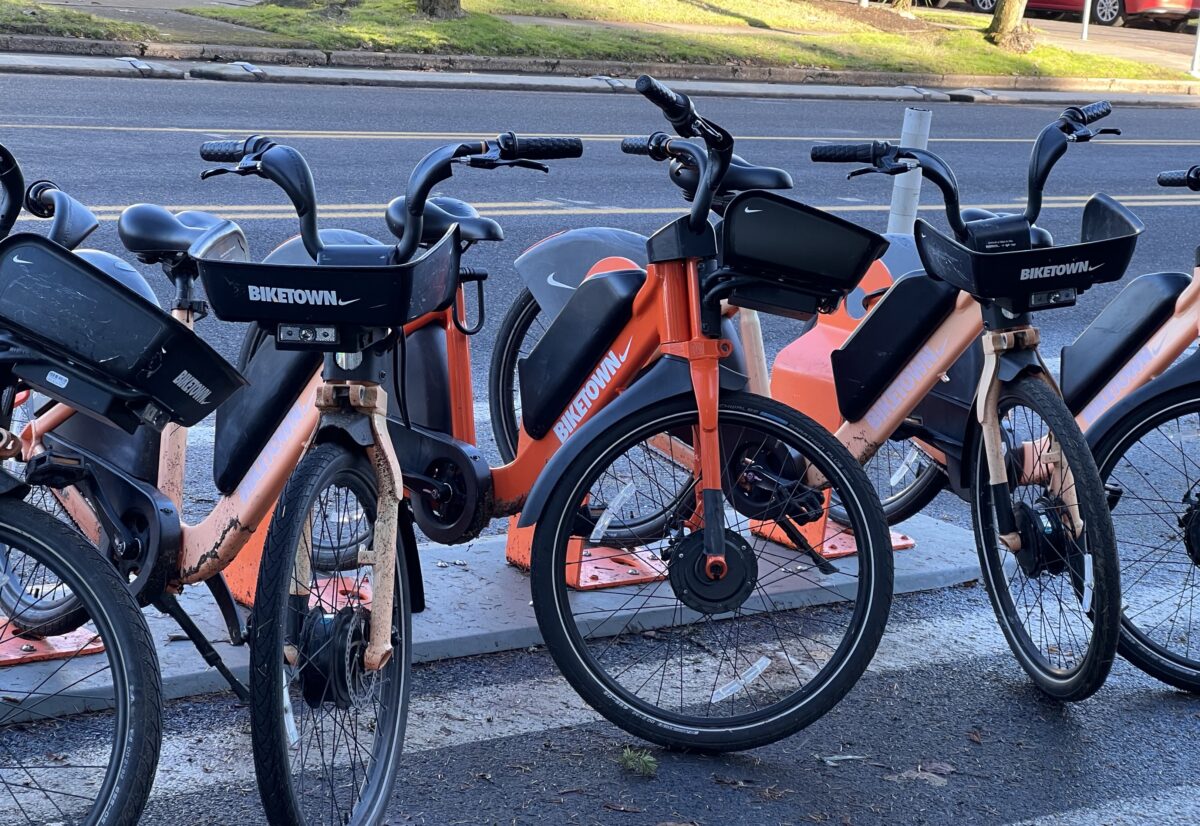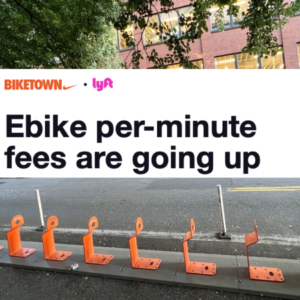This morning the team of workers who keep Portland’s Biketown bike share system up and running were greeted with an email that informed them they might not have a job come May 1st.
That’s the date when a new company will take over the maintenance duties of the Biketown fleet from Motivate LLC. According to workers employed by Motivate who have reached out to BikePortland in the past two days, Lyft, the company that owns Motivate and holds the bike share contract with the City of Portland, has chosen a new maintenance vendor. That puts about 20 full time employees who currently repair and maintain Portland’s bike fleet in limbo.
“We deeply appreciate the hard work from the Portland team over the years and everyone who has contributed to the organization,” read this morning’s email from Motivate CEO Matthew Parker. “We will be working with the new vendor to place as many of the current Portland staff as possible and create as smooth of a transition as possible for those impacted.”
“It was kind of a shock to me,” said Hazel Light in an interview Wednesday. Light has worked on Biketown for Motivate since 2018. She’s also the station chair for Transit Workers Union Local 320. “It’s an anti-union move in my opinion,” she added.
According to Lyft Communications Director Jordan Levine, Motivate was involved in a competitive procurement process and “given serious consideration.” In the end, Lyft chose Shift Transit instead. “We were most impressed with Shift Transit’s ability to provide service levels that meet PBOT’s and Lyft’s expectations,” Levine said.
Shift Transit already manages bike share fleets in Toronto, Tucson, Chattanooga, and Detroit. They also run the Biketown system at Nike World Headquarters in Beaverton. On their website, Shift Transit claims to be the leading bike share operator in North America with a portfolio that includes more than 15,000 docks and 8,500 bikes. It’s also notable that some employees of bike share systems managed by Shift Transit, like MoGo in Detroit, are already TWU members.
For her part, Light says she and her fellow employees, “Feel like the rug got pulled out from under them.” She worries that if the former Motivate workers aren’t rehired by Shift Transit, Biketown will suffer. “You would lose a lot of that knowledge, degrade service and it will result in fewer bikes on the street. It would really be a setback for bike share in the city,” she added.
According to Lyft, the move will also consolidate the maintenance and rebalancing contracts into one instead of two companies. Currently Motivate has the contract for maintenance and First Transit does the rebalancing work. Shift Transit will now take on both jobs, which Lyft says will result in “operations and staffing efficiencies.”
The move comes at a time when Biketown is outperforming expectations and continues to post strong ridership numbers — despite an aging fleet that hasn’t been increased in size since it launched in September 2020. Meanwhile, both cycling ridership numbers and traffic fatalities are headed in the wrong direction. Having a stronger Biketown fleet — especially in parts of town where new bike infrastructure sits relatively empty — could be the antidote to Portland’s biking blues.








Thanks for reading.
BikePortland has served this community with independent community journalism since 2005. We rely on subscriptions from readers like you to survive. Your financial support is vital in keeping this valuable resource alive and well.
Please subscribe today to strengthen and expand our work.
Lyft recently shut down NiceRide in Minneapolis
Yep…we will see if that same bike shoe drops in Portland.
I doubt it so long as Nike values the Biketown exposure. Plus the Shift Transit connection with the Nike HQ may have been the deal sealer…vs a now remote entity from NYC (vs old Alta Bikeshare).
Some of the people who will be laid off from Biketown because of this vendor change have been employed since 2016. If the deal-sealer was local connections, the workers who have been continuously working on the system for 7 years should not have been treated like this. Nike HQ, I believe, also uses completely different bikes unless they’ve upgraded from the SoBi bikes they used to use out there.
I hope this change succeeds in improving cost efficiency and thereby the sustainability of the BIKETOWN program. I didn’t expect to use it North Portland but the city’s epidemic of bike thefts has me loathe to leave my rig for more than a couple minutes, so I rode several times last year.
It will not, or if it does, it will come at the expense of workers. The new company significantly underbid Motivate. The only way to do this in a business where your costs are tools, which are marginal,
and labor is to lower wages and benefits.
It’s also baffling to raise prices by 50% citing labor costs, and then go with a cheaper vendor who could only be cheaper by virtue of wage cutting. It’s clearly a union-busting move.
I’d rather have a sustainable program that pays market wages and promotes cycling than an unsustainable program that goes kaput.
I just wish Biketown wasn’t so damn expensive, even for annual members, and they just raised their hourly rate by 50%. I also don’t like being penalized for not returning a bike to a hub when if I provide the same service in reverse–taking an out-of-hub bike and returning it to a hub–I get no benefit.
Also, having the airport excluded from the zone is a mistake, IMO.
The inefficiencies are Lyft’s to begin with. Before they took over, Motivate ran both repairs and rebalancing. When Lyft got the contract, they split the work so they could shift rebalancing to First Transit, who paid lower wages and have suffered from constant staff turnover. Whereas the Motivate team has retained workers for years and years, whose experience and dedication have increased efficiency and safety for the system’s maintenance. Many problems with service interruption, slow maintenance, scarcity of bikes, low batteries, and poor rebalancing are entirely Lyft’s fault – poor supply chain, disastrous proprietary maintenance app, firmware updates that crash the system, etc.
I don’t care about Motivate as a company, but the Portland team has worked around so many obstacles made by Lyft to provide good service (and meets their contractual agreements with Lyft consistently), and it just isn’t possible to provide that level of service with all green hires, at lower wages and (I’ll wager) higher turnover and more responsibilities. Lyft just raised their prices while citing labor costs, while contracting with a company that low-balled their prices. They want to extract the maximum amount of money from users with the absolute worst quality bicycles they can get away with.
The city should never have agreed to a contract that gives them zero ownership or control of any aspect of the bikeshare.
zzz: can you go deeper into your statement about Lyft bikeshare?
¨Many problems with service interruption, slow maintenance, scarcity of bikes, low batteries, and poor rebalancing are entirely Lyft’s fault – poor supply chain, disastrous proprietary maintenance app, firmware updates that crash the system, etc.¨ Or point to the report these points are made?